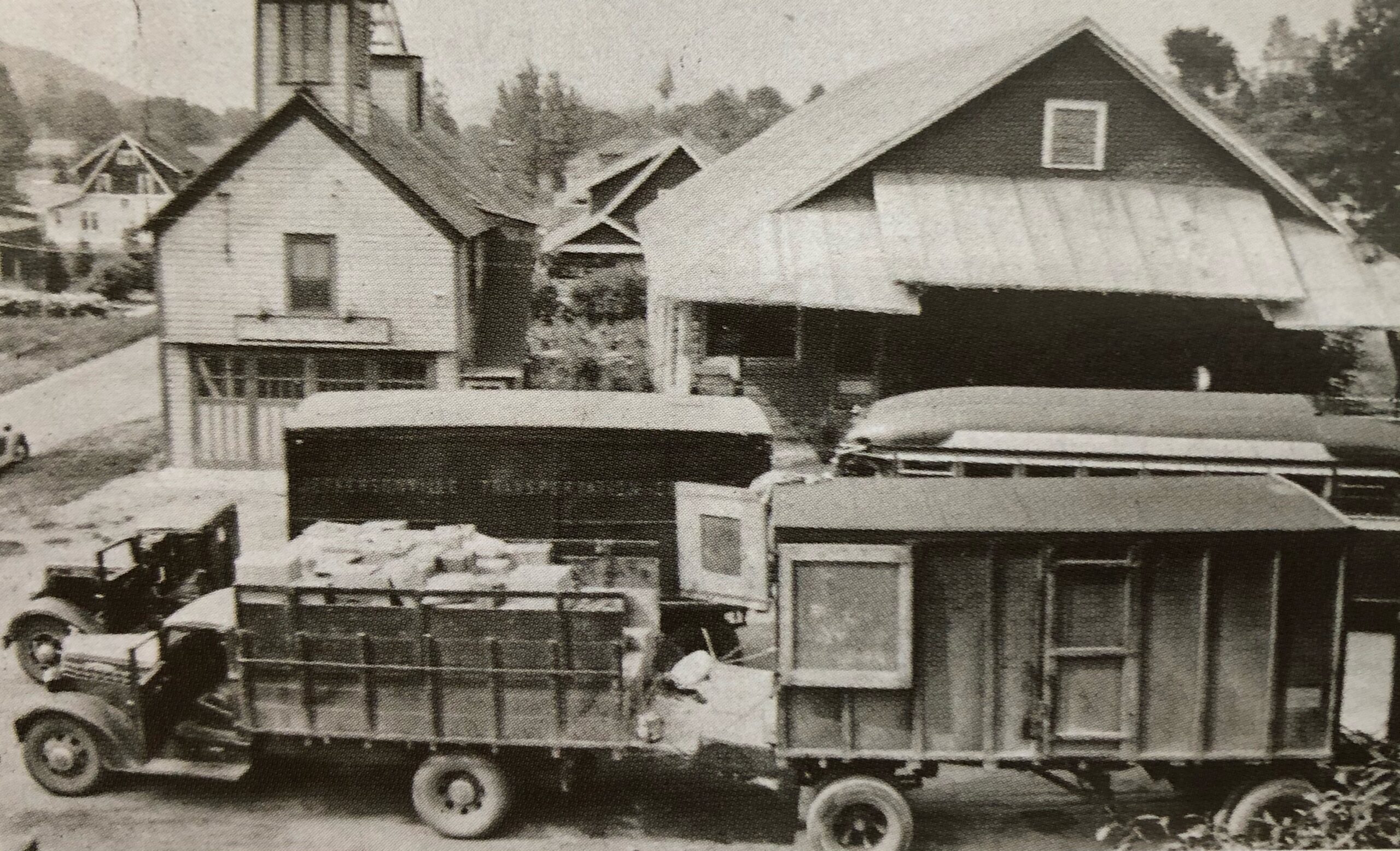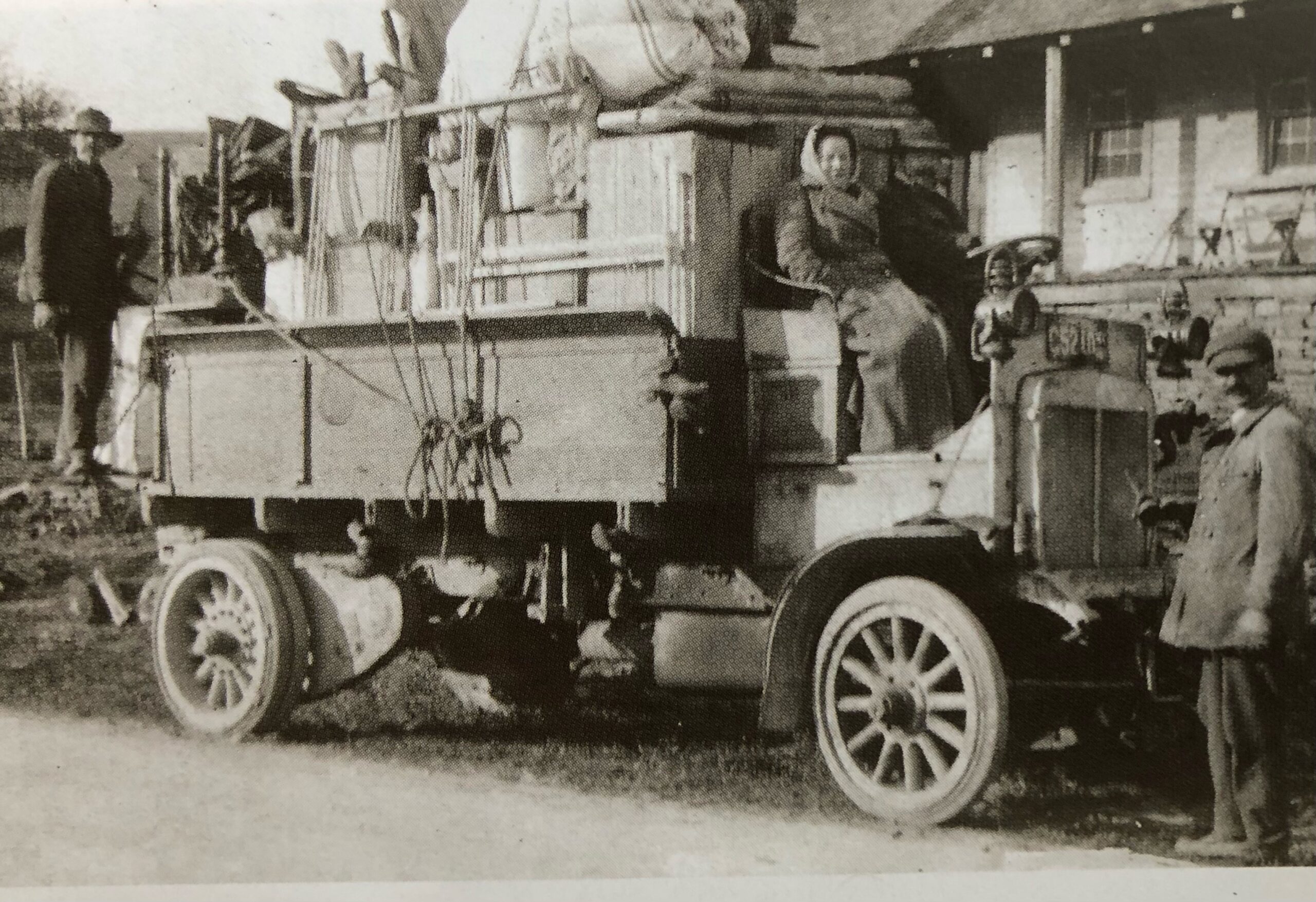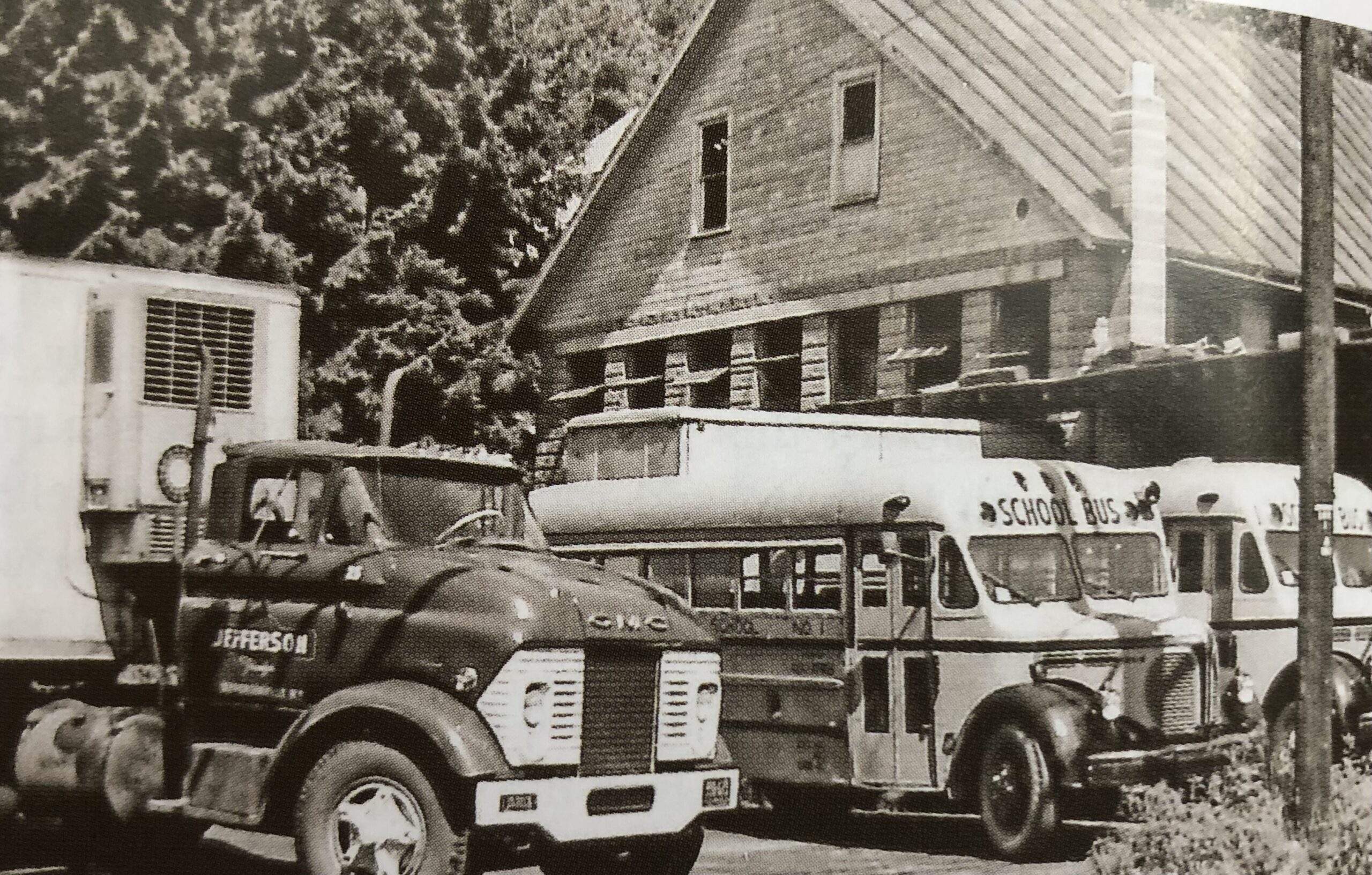


|
|
Written by Michael Duttweiler
Jeffersonville Transportation Company
Residents of Center Street and Jefferson Avenue in Jeffersonville from the 1920s through the 1970s likely viewed the Jeffersonville Transportation Company as a noisy and dusty neighbor congesting otherwise quiet streets. Today’s visitors to the Western Sullivan Public Library on Center Street would be hard pressed to see it as a garage crammed to the rafters with tools, trucks, buses, and groceries. For me, Jeffersonville Transportation was our family business started by my grandfather Frederick H. Duttweiler and continued by my father, Russell E. Duttweiler. Its history spans periods of dramatic change in the transportation industry and the economy of Jeffersonville and Sullivan County — from horse-drawn cutters to luxury motor coaches roaming the continent.
Fred Duttweiler’s family was part of the influx of Swiss settlers to Jeffersonville in the 1840s and 1850s with Fred’s father, Jacob, arriving in 1853. That is a story in itself involving a land swindle and forced relocation to land at the corner of Swiss Hill and Goebel Roads. They were farmers and stone masons, among whose projects were the beautiful stone arched bridges of the area.
In 1909 at the age of 27, Duttweiler assumed his first official role in the transportation business by becoming a rural mail carrier moving mail to and from the Liberty Ontario &Western Rail Road station to Jeffersonville using a team of black horses and a four-seat surrey. It’s likely that this initial transportation venture was largely a matter of being in the right place at the right time. Becoming a mail carrier, while perhaps an individual risk, hardly was novel; there were dozens of mail carriers across the state. The steps Duttweiler took beyond this initial modest venture had much to do with the unique times, especially the integral role of rail transportation in rural development and the growing vacation lodging trade in Sullivan County.
The Duttweiler family, like many others in the area, had added guest lodging to their farm operations building a sizeable boarding house on Swiss Hill. Between the transportation needs of his family’s guests and seeing the thousands of tourists coming and going from the Liberty O&W train depot, Duttweiler saw a new business opportunity. His first big step was in 1911, the purchase of a Model T bus to carry passengers between Jeffersonville and Liberty. By his third year in business, Duttweiler had married Helen Eggler, also a descendent of early Swiss settlers, bought a home on “The Island” in the village, expanded passenger transportation between Jeffersonville and Liberty, and added local freight hauling to his venture.
That first Model-T bus was just the start. Multiple other vehicles soon joined the Duttweiler taxi fleet first operating initially on an on-request basis followed by regularly scheduled routes. His new service was appreciated. The Jeffersonville correspondent to the Liberty Register reported in December 1915: “We cannot help making comment on the efficient automobile service rendered our people here, as well as other points along the line from Jeffersonville to Liberty, by Frederick H. Duttweiler of this place. Fred still makes two trips daily to Liberty with his auto and gives us quick and excellent service. Liberty, as well the O. and W. R.R., receive much patronage from here, through Mr. Duttweiler’s courtesies. Fred shoveled his own track so as to make it passable for auto service and we wish to make known to him through the columns of this valuable paper our appreciation of his efforts and service.”
Today it’s hard to envision that the small Village of Jeffersonville with a population of less than 500 could provide enough demand to support viable taxi and bus services but it did. According to the Catskill Institute, the list of nearby lodging options in the early 1920s included venues like: boarding houses run by the Arndt, Von Bergen, Hess, Wahl, Welch, Mall, Sohl, and Likel families and larger venues such as the Franklin House, Hotel Jefferson, the Mansion House, Smith’s Maple Grove, Sunnyside Farm, Muldavinville Bungalows, and Tonnison’s White House. Nearby Kenoza Lake had 26 establishments. There were 25 establishments in the Youngsville community and 11 in White Sulphur Springs both on the route to Liberty. Liberty had 54 listings and neighboring Ferndale had more than 90. The need was there. In the 1920s, Duttweiler added multiple taxis, larger buses, and additional daily runs to and from Liberty.
Early motorized transportation was a hazardous venture with unskilled drivers, poor roads and maintenance, and ill-designed equipment. The local papers describe many mishaps including several involving Duttweiler and his vehicles. There were numerous fender benders, and buses and taxis routinely broke down or were stuck in the mud or snow. That first Model T caught fire and burned to the frame near Liberty as Fred and his passengers tossed on dirt in vain.
Despite these early travails, the Duttweiler family became fully committed to the transportation business by incorporating the Jeffersonville Transportation Company in 1919. This truly was a family affair; incorporators along with Duttweiler included Almeda and Annie Eggler, Helen Eggler Duttweiler’s sisters, and August Neuberger who was Fred’s brother-in-law. The incorporation value of $3,000 had to be the bulk of the assets of these families representing a significant leap of faith in this new venture. By 1920, the Jeffersonville Transportation Company was off to a dynamic start with combined taxi, bus service, and freight transport. Multiple vehicles fanned out from the hamlet of Jeffersonville.
1924 was a landmark year for the Duttweiler family and business. A new Duttweiler home was purchased on the corner of Center Street and Jefferson Avenue (later to become my childhood home). As the fleet grew, so did the need for covered space for servicing vehicles and for storage of goods in transit. That same year, land was purchased across the street from the new house and the Jeffersonville Transportation Company garage was erected. That structure today is the Western Sullivan Public Library building.
Many taxi, bus, and truck transportation firms surfaced in the 1920s. The railroads fought back through legal, regulatory, and political channels but eventually lost the battle. Truck and bus operators came under increasing regulation by the Interstate Commerce Commission and New York Public Service Commission requiring competition for specified routes and roles. Duttweiler scored a major coup when in 1929 he obtained rights to provide daily service between Jeffersonville and New York City. By 1929, the Jeffersonville Transportation Company fleet consisted of eight buses and taxis plus several trucks.
In the 1930s, passenger transportation preferences shifted dramatically toward passenger cars despite the economic burdens of the Great Depression. In addition, some larger hotels started providing direct charter services to their facilities. Seeing the handwriting on the wall, Duttweiler began focusing his bus operations on touring, first providing area tours to tourist destina- tions like Ashokan Dam. By the mid-1930s, he had affiliated with Yelloway Lines and began chartering tours across the country including holding long-term contracts with Major Bowes Talent Shows and the Maganini Chamber Orchestra.
As local schools were centralized, it was a natural step for Duttweiler to add pupil transportation to the mix. Starting with runs to feeder schools like the Faubel District before the consolidated new school was built in 1938, for the next 45 years thousands of Jeffersonville students would travel Duttweiler buses.
Daily bus transportation from Jeffersonville to New York eventually was dropped but the Liberty to New York route continued until the rights were allowed to lapse during WWII. Freight operations continued to evolve and became focused on transporting groceries to hotels and camps in Western Sullivan County and northeastern Pennsylvania. By 1940, as he approached 60 years old, Fred Duttweiler had built a profitable transportation business. WWII and the economic boom that fol- lowed would reshape the business once again, leading to the final chapter for the firm.
At 67, and one suspects with a lot of urging from spouse Helen, Fred began the formal transition of the business to his son Russell making him full partner in 1949. Fred remained an active partner in decision making but his involvement in daily operations was limited. By this time, the large long-distance motor coaches were long gone leaving only limited school transportation as the remaining passenger transport. The distribution of groceries and supplies flourished, supplemented by the occasional moving job. The old fire house next to the Duttweiler garage was purchased and attached to the main garage providing additional freight and vehicle storage. The business was in good shape with clear focus, a solid fleet, and quality facilities. It was time to for Fred to move on. The final transfer of the Jeffersonville Transportation Company to Russell Duttweiler was completed in 1953.
The company existed for another 28 years but continued to evolve under Russell Duttweiler’s leadership. The grocery distribution industry changed dramatically when food wholesalers developed fleets of their own leading to the phase out of grocery hauling in 1965. There remained a role in supporting Sullivan County tourism by distributing milk and milk products from the Crowley milk plant in Binghamton to Western Catskill distributors. In the 1960s, before the precipitous decline of the “Borscht Belt” tourism industry, there were four daily runs of tractor-trailers from Binghamton to Sullivan and Ulster Counties throughout the summer season. The remaining two routes were sold off in 1970. With consolidation of the Jeffersonville Youngsville Central School, pupil transportation had become the central part of the business. As Russell in turn decided it was time to retire, all remaining bus routes were sold off in 1981, dissolving the Jeffersonville Transportation Company twelve years after the death of its founder Frederick H. Duttweiler.
The last vestiges of the Jeffersonville Transportation Company are well disguised today. In addition to the library, the appended firehouse and freight building served for a while as the home of the Jeffersonville ambulance corps. It now is the Village of Jeffersonville office including the Russell E. Duttweiler Community Hall, so designated to recognize his years as village trustee and mayor. At first it was hard for me to accept that the Jeffersonville Transportation Company was no more. The business and the family members I miss daily are interwoven in my memory. It’s nice to know that some of what they built remains to serve Jeffersonville yet today.
Michael Duttweiler was raised in Jeffersonville, and lived there through his undergraduate college years. He graduated from J.Y.C.S. and is married to Linda Redington Duttweiler, also from Jeffersonville. A career-long adult educator with Cornell Cooperative Extension, he has long-standing interest in local history of the Catskill Mountains and other regions of New York. He is a three-time graduate of Cornell University holding degrees in natural resources and a doctorate in education. Now retired, he lives with his family in Ithaca, New York.
References
Catskill Institute (undated) Hotels and Bungalows. http://catskills.brown.edu/
Duttweiler, Michael W. (2014) From Cutters to Motor Coaches: Pioneering Commercial Transportation in the Catskills. Fast Pencil Publishing Company, Campbell, CA.


